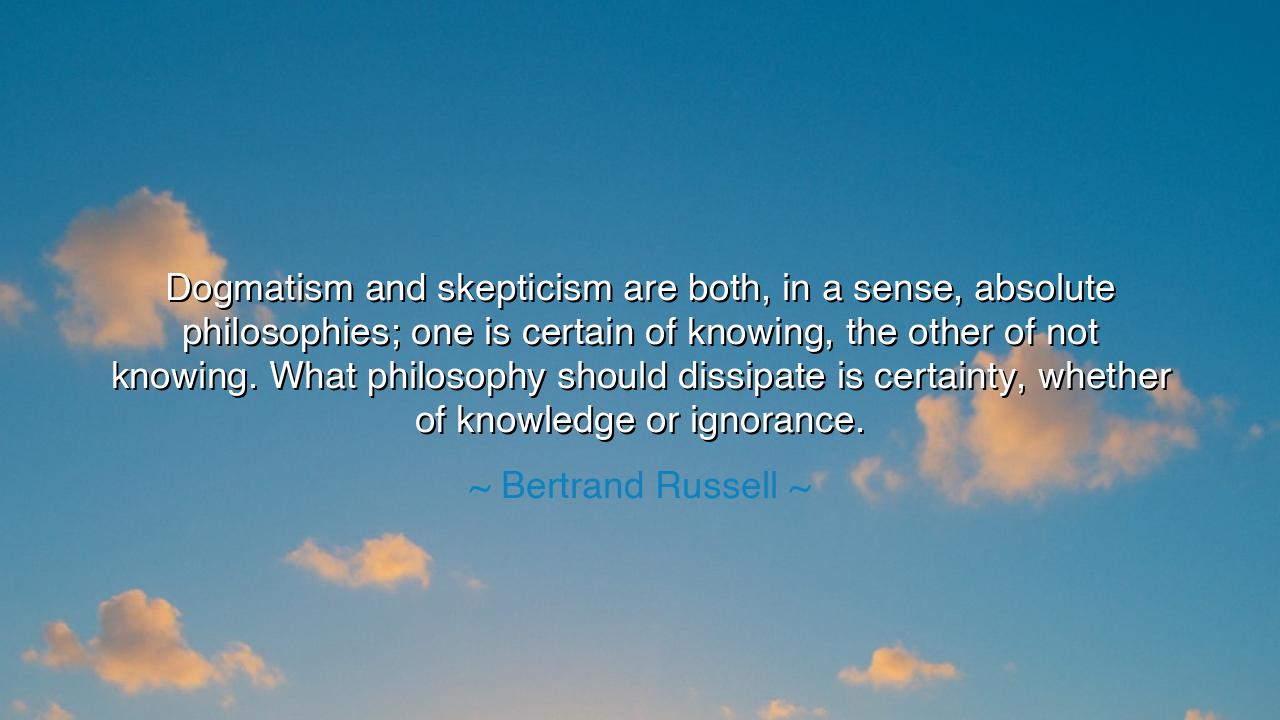
Dogmatism and skepticism are both, in a sense, absolute
Dogmatism and skepticism are both, in a sense, absolute philosophies; one is certain of knowing, the other of not knowing. What philosophy should dissipate is certainty, whether of knowledge or ignorance.






Bertrand Russell, with words as sharp as a sculptor’s chisel, warned us against the twin illusions of the human mind: dogmatism and skepticism. One, swollen with pride, declares: “I know!” The other, cloaked in despair, sighs: “Nothing can be known!” Both are forms of certainty, and both imprison the soul. For the human spirit, when it clings too tightly to either extreme, forgets that wisdom lies not in rigid walls but in the open sky of questioning, in the restless wind of inquiry.
The ancients themselves wrestled with this tension. The dogmatists were like stone towers—unyielding, lofty, and secure, but blind to the horizons beyond their own walls. The skeptics, on the other hand, wandered like rootless exiles, declaring all paths uncertain, unwilling to rest anywhere for fear of being deceived. Russell calls us to dissolve these certainties, to embrace the humility that comes when we admit: “Perhaps, I do not know fully; yet perhaps, I know something.” It is in this balance—between confidence and doubt—that philosophy finds its sacred task.
Consider the story of Socrates, who stood in the courts of Athens accused of corrupting the youth. His accusers claimed knowledge of virtue, justice, and the will of the gods. Socrates, unlike them, declared that he was wise only in knowing that he did not know. He was no skeptic in the extreme sense—he did not deny all possibility of truth—but neither was he a dogmatist who clung to false certainties. His “ignorance” was a fertile soil from which questions grew, and through questions, the city of Athens was awakened to deeper truths. This is the living embodiment of Russell’s call: to cast off the certainty of knowing and the certainty of ignorance alike.
Look also to history’s tragedies when certainty hardened into chains. The Inquisition, burning those who dared to question the church’s dogma, was certainty weaponized. Yet, on the other side, there have been thinkers who, declaring all knowledge impossible, paralyzed generations from progress. Both errors spring from the same poisoned root: the belief that certainty itself is a fortress of safety. But Russell’s wisdom reminds us that the fortress is an illusion; the real strength lies in movement, in questioning, in embracing uncertainty with courage.
What then is the lesson for us, wanderers in the modern age? We must be wary of voices that thunder with absolute assurance, whether in politics, religion, or science. And we must also beware of those who smirk and say, “Nothing can be known, nothing matters.” The first leads to tyranny of belief; the second leads to the abyss of despair. Between them lies the way of the philosopher: a path of inquiry, of humility, of patient listening, where each answer births a new question, and each question opens the heart wider to the world.
In your own life, practice this teaching not in abstract words, but in the daily encounters of thought. When you feel the fierce desire to be certain, pause and ask: “What if I am wrong?” And when despair tempts you to declare, “Nothing can be known,” instead ask: “What small truth can I glimpse, even through the veil of uncertainty?” In this way, you avoid the chains of arrogance and the fog of nihilism alike.
Let your conversations be fertile with questions rather than sharpened with finality. Let your heart be wide as the sea, receiving the rivers of knowledge, and yet humble enough to admit its vastness cannot be contained. For in this rhythm—between knowing and not knowing—you will find the living pulse of philosophy. And from that pulse arises not sterile certainty, but the music of wisdom: a song that guides humanity forward, generation after generation.
Thus remember Russell’s teaching: philosophy must dissipate certainty. It does not rob us of truth; it delivers us from the prison of absolutes. Walk, then, with courage in the twilight between knowledge and ignorance. Seek, question, listen, and grow. For in this seeking lies the noblest strength of the human spirit.






AAdministratorAdministrator
Welcome, honored guests. Please leave a comment, we will respond soon